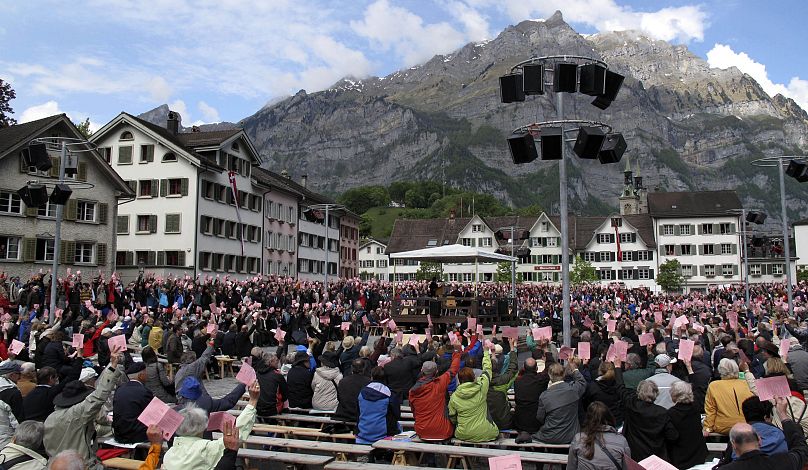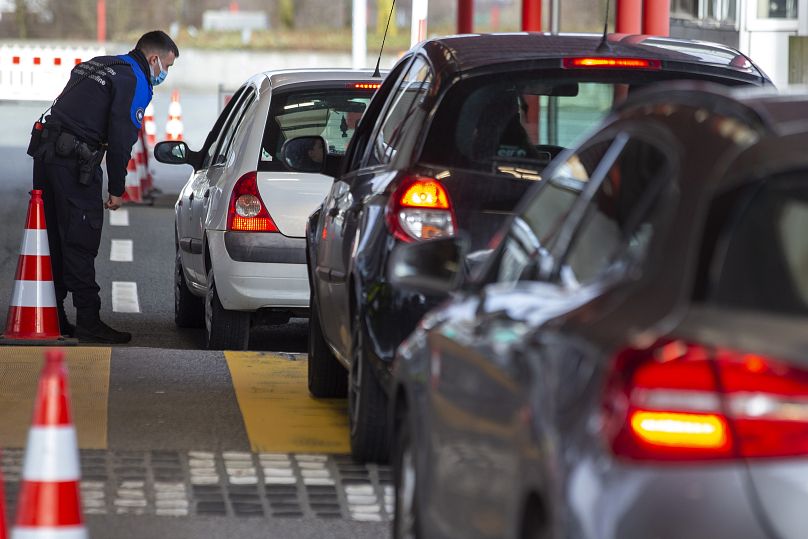Euronews looks into the past, present and future of Switzerland's cooperation with the EU after Swiss leaders rejected signing a long-delayed framework agreement with Brussels on Wednesday.
Switzerland, a small nation of 8.6 million at the heart of Europe, is surrounded by European Union countries.
 ADVERTISEMENT
ADVERTISEMENT
 ADVERTISEMENT
ADVERTISEMENT
While it has chosen to remain outside the 27-nation bloc, it has maintained a close relationship with the EU, which is by far its largest trading partner.
About two-thirds of Swiss imports come from the bloc, while half of the country's exports go to the EU.
An estimated 1.4 million EU nationals live in Switzerland, while 450,000 Swiss citizens are residents in EU countries.
No fewer than 120 deals between Brussels and Bern were concluded over recent decades, ranging from agriculture to police cooperation.
So why has the Swiss government just pulled out of a seven-year negotiation with the EU to modernise the pair's relationship?
The collapse of talks on Wednesday may seem like a huge paradox, considering the breadth and depth of the cooperation between the two, their economic and political ties as well as their geographic and cultural proximity.
Beyond the headlines, Euronews looks into the unique and sometimes thorny relationship between Brussels and Switzerland.
What's the history of EU-Switzerland relations?
It all started in 1972 when Switzerland and the ancestor of the EU -- known as the European Economic Community -- concluded their first free trade agreement over industrial goods and agricultural products. The deal is still in force today.
In 1990, the deal was complemented by a new agreement simplifying customs controls and trade formalities.
Two years later, Switzerland requested the opening of negotiations to join the bloc -- known at the time as the European Economic Community.
But the push for membership talks was halted after Swiss voters rejected joining the European Economic Area in a referendum at the end of that year.
The rejection marked a "key turning point" in EU-Swiss relations, said Paolo Dardanelli, a reader in comparative politics at the University of Kent.
He said that was because Switzerland from that point on was "on its own" and "had to find a way, a modus vivendi with the EU."
In 1997 and in 2001, federal popular initiatives on opening membership negotiations with the EU were opposed by about three-quarters of Swiss voters.
Why is Switzerland opposed to EU membership?
The rejection of European integration can be seen as the continuation of the country's long tradition of neutrality. Under that principle, Switzerland refrained from participating in World War II and in the Cold War, for instance.
Nowadays, however, neutrality is not as prominent as it used to be, Dardanelli told Euronews, and what dominates is a strong attachment to preserving national sovereignty.
Swiss citizens are also concerned that joining the EU would not be compatible with their cherished direct democracy system.
"In Switzerland, you can vote on anything really. You can collect signatures and vote on changing the constitution and any other aspect" of policy-making, Dardanelli explained.
"The Swiss would want to be part of the EU economically but they don't want to be part of the EU politically," said Laurent Goetschel, director of the think tank Swisspeace and professor of political science at the University of Basel.
What is the current framework for cooperation?
In light of Switzerland's refusal to join the bloc, cooperation developed on the basis of ad hoc agreements.
In 1999, Switzerland and the EU signed a package of seven agreements, covering among other things the free movement of persons. This gave citizens on each side the right to live and work in the EU or Switzerland, provided they had a job or other sources of income.
Another set of sectoral agreements came in 2004, establishing Switzerland's participation in the EU's borderless Schengen area.
In total, there are currently more than 120 agreements between Switzerland and the EU.
These agreements automatically apply to new member states when they join the EU, except for the accord on the free movement of people, which is renegotiated with each new country.
Under this framework, cooperation has thrived. Switzerland and the EU are key economic partners, with trade exchanges amounting to about €1 billion every working day.
Switzerland is also the bloc's fourth-largest trading partner after China, US and the UK.
An estimated 25% of Switzerland's workforce is made up of EU citizens, of which 343,809 are cross-border workers.
What are the sticking points in the relationship?
Issues surrounding the status of workers in connection with immigration are the main source of tensions between Switzerland and the EU.
The wealthy nation boasts much higher wage levels and social protection than its EU neighbours and is wary of so-called "wage-dumping," especially when cross-border workers are employed in Switzerland under foreign contracts, Dardanelli explained.
"Switzerland tries to protect the wages and the working conditions of its workforce," the scholar said including by so-called "flanking measures".
Meanwhile, "the EU wants to eliminate those to create a level playing field in terms of competition," Dardanelli added.
Tensions over the free movement of workers culminated in 2014 with a popular referendum.
"In 2014, an initiative to restrict immigration, which was directly against the agreement with the EU, was put to the vote and was narrowly endorsed," Dardanelli noted.
The move angered Brussels, even if the measure was never fully implemented.
One of the problems, Dardanelli said, is that "these agreements are divided into packages and that they are linked to each other. So legally, if you denounce one, the other ones also fall."
A compromise was found to save the face of the government while salvaging cooperation with the EU but that also meant that "what people voted for was not really put into practice," Dardanelli noted.
The softened text adopted by the Swiss parliament in 2016 gave nationals priority in the jobs market and made it harder for Swiss employers to hire EU citizens.
Taxation and banking secrecy, cornerstones of the powerful Swiss financial system, were long among the flashpoints of the relationship.
But these issues have been addressed through several agreements concluded in recent years. In 2015, Bern and Brussels signed an agreement on the automatic exchange of taxation information. From 2018, Switzerland and each EU member state started automatically exchanging banking data.
Beyond these specific policy areas, what Switzerland wants above all is to maintain its national independence and sovereignty.
"Ideally, the EU would like Switzerland just to adapt itself automatically to the norms and legislations that the EU adopts. Switzerland finds it difficult to do because it feels as it becomes just a vassal state to the EU," Dardanelli said.
What led to the collapse of the talks on Wednesday?
The long-time frictions between Switzerland and the EU again came into play during recent negotiations.
For a long time, the EU pressed Switzerland to go beyond ad hoc cooperation agreements and pushed for an umbrella framework deal, insisting no new bilateral accords could be signed until then. But those talks came to an abrupt halt on Wednesday.
The negotiations essentially stumbled over EU demands for its citizens to have full access to the Swiss labour market. Switzerland resisted such a move, arguing it might result in non-Swiss citizens getting social security rights.
Access of EU firms to the Swiss market was another "hot potato", said Goetschel.
But what dominated was "general scepticism about the framework agreement, which was about the dynamic adaptation of Swiss legislation to legislative developments in the European Union, and also a certain role of the European Court of Justice". The Swiss "are allergic to what we call foreign judges", the expert noted.
Ultimately, "the government came to the conclusion that such a treaty would not have enough chances in a popular referendum", Goetschel said.
"This to me is quite interesting because those who lean towards Europe have over the years been extraordinarily over-optimistic about their chances of getting things through. And now they have changed tune, they think they can't get it through even though some polls are saying 64% would support it," said Clive Church, an emeritus professor of European studies at the University of Kent.
"So it seems to me that there are concerns about sovereignty and there are concerns about political management that underlie the more empirical questions," Church told Euronews.
What happens next?
Swiss leaders said the country hoped to remain a close partner of the 27-nation bloc.
But the EU has suggested that a lack of common rules could cause Switzerland to lose its “privileged” connection with the bloc’s electricity system and that failure to reach an accord was "hampering access of Swiss air carriers to the EU’s internal market”.
The bloc furthermore said that cooperation in the health sector or labour market would suffer.
"The EU could also be nastier in other fields. So for example, they could prevent Switzerland from participating in the next Horizon research programme or allow it only under certain conditions that would be to the disadvantage of Switzerland," Goetschel told Euronews.
On a more positive note, Dardanelli said there was "still a lot of goodwill on the two sides to find a way forward".
"So I imagine this to an extent is also a bit of an act of brinkmanship on the part of Switzerland trying to signal to the EU that it doesn't want to be pushed on these issues", noting that the country will expect the EU to compromise further.
Yet Brexit has further complicated the picture, according to Dardanelli.
Before Britain left the bloc, "the EU was quite accommodative, but because of Brexit, it has become much more worried about making exceptions and creating new loopholes that then could be exploited," the scholar told Euronews.
Switzerland's relationship with the EU has also drawn comparisons with that of Britain, especially now, Church noted, in that "it put sovereignty above everything, including economic gain".












